Please fill out the following information, and RRFC Admissions will contact you to discuss our program offerings:
Issue #211
by Liya Swift
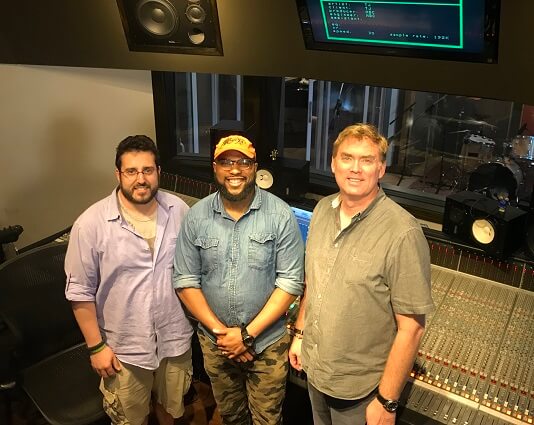
Michael Bader, Derek Bradford, and Mark Christensen at Engine Room Audio
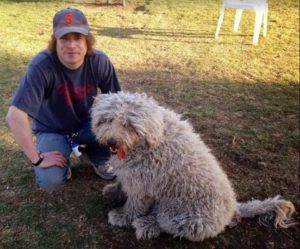 Los Angeles-based Film Connection screenwriting mentor Eric Abrams (Married…with Children, Liv & Maddie) has the following tip:
“You always want to make it as difficult as possible for characters, or else why are we watching this? Challenges met and mastered. You want to make it an obstacle course for them. The second act is when things are looking most grim…[Your characters] should always want different things. That’s how you get conflict…She wants him to get a better job, and he wants to get out of there as soon as possible. Those are two different wants, and yet they’re forced together and it’s going to be awkward. If they get along great, you probably don’t have a very interesting scene. We want that in real life, but not when we’re paying, what is it, $12 to see a movie these days.”
ON KNOWING YOUR SCREENPLAY’S CHARACTERS
Los Angeles-based Film Connection screenwriting mentor Eric Abrams (Married…with Children, Liv & Maddie) has the following tip:
“You always want to make it as difficult as possible for characters, or else why are we watching this? Challenges met and mastered. You want to make it an obstacle course for them. The second act is when things are looking most grim…[Your characters] should always want different things. That’s how you get conflict…She wants him to get a better job, and he wants to get out of there as soon as possible. Those are two different wants, and yet they’re forced together and it’s going to be awkward. If they get along great, you probably don’t have a very interesting scene. We want that in real life, but not when we’re paying, what is it, $12 to see a movie these days.”
ON KNOWING YOUR SCREENPLAY’S CHARACTERS
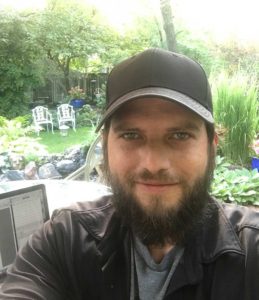 Film Connection screenwriting mentor Aaron Feldman (PewDiePie, Poop Talk) is a big believer in getting in deep and knowing your characters through and through, then learning what it takes to bring that to the page.
“Make a three-dimensional character that you know you can talk to because, essentially, you have conversations with these characters [as you write]. And if you know your character, you’ll understand how they’re going to react. So whatever situation you have, you’re basically creating a sandbox, and you can create the scenario that brings them up, brings them down, or that inevitably leads to success or failure…The great thing about screenwriting is that you get to be all these different characters, the good guys, the bad guys. Visualize everything. It’s a daunting task, but then it comes together and it all has to do with great characters…Again, it’s character, character, character.”
ON CONFLICT AS AN ESSENTIAL COMPONENT OF CHARACTER
Film Connection screenwriting mentor Aaron Feldman (PewDiePie, Poop Talk) is a big believer in getting in deep and knowing your characters through and through, then learning what it takes to bring that to the page.
“Make a three-dimensional character that you know you can talk to because, essentially, you have conversations with these characters [as you write]. And if you know your character, you’ll understand how they’re going to react. So whatever situation you have, you’re basically creating a sandbox, and you can create the scenario that brings them up, brings them down, or that inevitably leads to success or failure…The great thing about screenwriting is that you get to be all these different characters, the good guys, the bad guys. Visualize everything. It’s a daunting task, but then it comes together and it all has to do with great characters…Again, it’s character, character, character.”
ON CONFLICT AS AN ESSENTIAL COMPONENT OF CHARACTER
 Film Connection screenwriting mentor Ron Peterson (Crossroads Entertainment), stresses the relationship between the character and the conflict he or she must go up against.
“There is a direct relationship between character and conflict. As a simple example, what if I start with the movie of Rocky with a fighter, because we’ll agree that that conflict of Rocky is great, right? But…I can ruin that conflict in two seconds. What if I start the movie where Rocky is not an out-of-shape fighter, but Rocky is a fighter that can do 50,000 pushups, takes Vitamin B12, is in great shape, is like this wonderful person, and now that fighter gets to fight for the championship of the world? If that’s how I put his character, do you think there’s a conflict now? I just destroyed the conflict. So your choice of your character has as much as to do with the establishment of the conflict as the conflict itself.”
Want to prevent the all-too-common “Act 2 lag”? Get Ron’s tips on Story Transformation , all made easy to understand with examples from movies nearly everyone knows and loves.
ON HOW TO REVEAL THE THEME IN YOUR MOVIE
Film Connection screenwriting mentor Ron Peterson (Crossroads Entertainment), stresses the relationship between the character and the conflict he or she must go up against.
“There is a direct relationship between character and conflict. As a simple example, what if I start with the movie of Rocky with a fighter, because we’ll agree that that conflict of Rocky is great, right? But…I can ruin that conflict in two seconds. What if I start the movie where Rocky is not an out-of-shape fighter, but Rocky is a fighter that can do 50,000 pushups, takes Vitamin B12, is in great shape, is like this wonderful person, and now that fighter gets to fight for the championship of the world? If that’s how I put his character, do you think there’s a conflict now? I just destroyed the conflict. So your choice of your character has as much as to do with the establishment of the conflict as the conflict itself.”
Want to prevent the all-too-common “Act 2 lag”? Get Ron’s tips on Story Transformation , all made easy to understand with examples from movies nearly everyone knows and loves.
ON HOW TO REVEAL THE THEME IN YOUR MOVIE
 Seven-time Emmy nominee and Film Connection screenwriting mentor Ron Osborn has sage advice on the often daunting subject of theme in screenplay.
“No one should set out to write a theme. No one sets out to write “war is hell” as a theme. No, you sit down to write a story, and as you’re working it out, you realize what you’re really saying is war is hell. And once you know that, that becomes your compass. Now there’s the danger of playing the theme versus playing the plot, and you don’t want to do that. You want to play the plot and let the theme come out of it. By way of example, going back to “war is hell,” if you have a scene with two soldiers in a foxhole in WWII and they’re talking about what hell they’re going through, that’s playing the theme. But if they’re in a foxhole and it’s winter, and if they don’t start a fire they’re going to freeze to death, but if they start that fire they’re going to alert the enemy snipers to their location and probably get shot, that’s hell. You don’t have to tell me: as the audience, I get it. So you don’t want the theme to dominate; you want the theme to play underneath and guide you, but you want to play the plot and let me, as the audience, get to the theme.” Ron Osborn on Comedy, Drama, and Theme.
ON LETTING YOUR STORY GROW
Seven-time Emmy nominee and Film Connection screenwriting mentor Ron Osborn has sage advice on the often daunting subject of theme in screenplay.
“No one should set out to write a theme. No one sets out to write “war is hell” as a theme. No, you sit down to write a story, and as you’re working it out, you realize what you’re really saying is war is hell. And once you know that, that becomes your compass. Now there’s the danger of playing the theme versus playing the plot, and you don’t want to do that. You want to play the plot and let the theme come out of it. By way of example, going back to “war is hell,” if you have a scene with two soldiers in a foxhole in WWII and they’re talking about what hell they’re going through, that’s playing the theme. But if they’re in a foxhole and it’s winter, and if they don’t start a fire they’re going to freeze to death, but if they start that fire they’re going to alert the enemy snipers to their location and probably get shot, that’s hell. You don’t have to tell me: as the audience, I get it. So you don’t want the theme to dominate; you want the theme to play underneath and guide you, but you want to play the plot and let me, as the audience, get to the theme.” Ron Osborn on Comedy, Drama, and Theme.
ON LETTING YOUR STORY GROW
 Film Connection mentor Ana Bendaña believes in letting your creative mind get engaged in the writing process and easing up on the structural reigns, at first.
“You have to let the story grow. It’s almost like having a child. You have an idea and a vision of what it’s going to be like, and then you actually start nurturing the story and starting the story and building the story, and the next thing you know, it’s morphed into something completely different. It’s developed into something better, it’s progressed into something better, and I believe that writers should definitely allow room for that, unless you know 110% what exactly it is that you want.”
… AND THEN TRIMMING THE FAT
Then, when it’s time, cut what’s unnecessary. All your hard work has helped you grow real characters and a story that rings true, so do away with the ancillary stuff. What was once scaffolding is unnecessary.
“Trim the fat. If it’s not essential to what is happening in front of these characters, I would probably omit it. We only have a very small window into these characters’ lives…You’re showing your characters in situations that are very, very important for their development as a character. So you want to cut all the boring stuff. If it’s not essential to your story and it’s not essential to the scene and what’s happening in front of you, don’t include it.”
Ana’s tips on organizing, trimming and developing a winning screenplay!
Film Connection mentor Ana Bendaña believes in letting your creative mind get engaged in the writing process and easing up on the structural reigns, at first.
“You have to let the story grow. It’s almost like having a child. You have an idea and a vision of what it’s going to be like, and then you actually start nurturing the story and starting the story and building the story, and the next thing you know, it’s morphed into something completely different. It’s developed into something better, it’s progressed into something better, and I believe that writers should definitely allow room for that, unless you know 110% what exactly it is that you want.”
… AND THEN TRIMMING THE FAT
Then, when it’s time, cut what’s unnecessary. All your hard work has helped you grow real characters and a story that rings true, so do away with the ancillary stuff. What was once scaffolding is unnecessary.
“Trim the fat. If it’s not essential to what is happening in front of these characters, I would probably omit it. We only have a very small window into these characters’ lives…You’re showing your characters in situations that are very, very important for their development as a character. So you want to cut all the boring stuff. If it’s not essential to your story and it’s not essential to the scene and what’s happening in front of you, don’t include it.”
Ana’s tips on organizing, trimming and developing a winning screenplay!
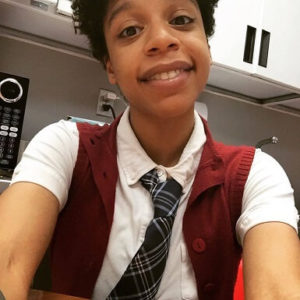 Film Connection student Tonea Melvin who externs with at Dean Ronalds Falling Up Films (Manhattan, NY) Is blazing full steam ahead and we love her energy! “I haven’t pulled so many all-nighters since high school, and I am kind of loving it…I am a huge planner; I plan everything-even when I know it’s not going to go to plan. So I have mounds of papers on my desk right now, all color coordinated, with paper clips and binder clips flying everywhere. I’m enjoying taking my characters apart and making massive character charts, drawing maps and outlines, all the things that go into figuring out which archetypes fit where in my stories…now I get to really play around with my characters’ worlds. I can’t wait until I can quit my job at Target and write all day, because building these worlds is so much fun! …I also plan on shooting my first commercial this week, so stay tuned for that video!”
Film Connection student Tonea Melvin who externs with at Dean Ronalds Falling Up Films (Manhattan, NY) Is blazing full steam ahead and we love her energy! “I haven’t pulled so many all-nighters since high school, and I am kind of loving it…I am a huge planner; I plan everything-even when I know it’s not going to go to plan. So I have mounds of papers on my desk right now, all color coordinated, with paper clips and binder clips flying everywhere. I’m enjoying taking my characters apart and making massive character charts, drawing maps and outlines, all the things that go into figuring out which archetypes fit where in my stories…now I get to really play around with my characters’ worlds. I can’t wait until I can quit my job at Target and write all day, because building these worlds is so much fun! …I also plan on shooting my first commercial this week, so stay tuned for that video!”
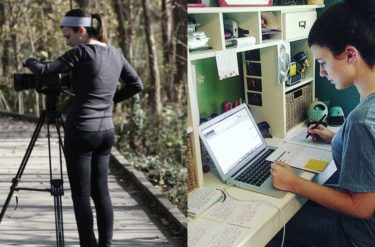 In a recent blog post entitled “The Bittersweet End,” soon-to-be Film Connection graduate Jessica Wise had this to say: “My time with Film Connection is coming to a close. It’s impossible to put into words just how much I have learned and experienced through this program and with Wrigley Media Group. I’m glad I got to witness firsthand all that goes on in a production company and how films and commercials are shot, edited, and distributed. It was all way more insightful than anything I could have been taught in a classroom. It’s weird to say bye to it all but I am looking forward to the world that awaits!…
I’m ready to finalize my script and set up a meeting with a producer! I’m equal parts scared and excited!”
In a recent blog post entitled “The Bittersweet End,” soon-to-be Film Connection graduate Jessica Wise had this to say: “My time with Film Connection is coming to a close. It’s impossible to put into words just how much I have learned and experienced through this program and with Wrigley Media Group. I’m glad I got to witness firsthand all that goes on in a production company and how films and commercials are shot, edited, and distributed. It was all way more insightful than anything I could have been taught in a classroom. It’s weird to say bye to it all but I am looking forward to the world that awaits!…
I’m ready to finalize my script and set up a meeting with a producer! I’m equal parts scared and excited!”
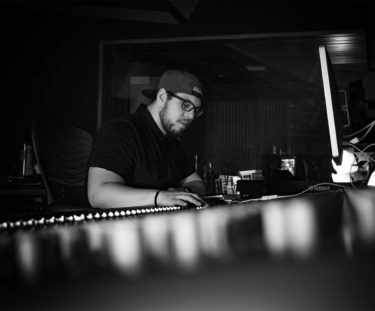
Recording Connection mentor Luis Pacheco
 Heard our Student Music Mixtape yet? In partnership with Symphonic Distribution, we’re excited to help our students get their music out to the world!
The Recording Connection is now offering this great opportunity for our students to broaden their understanding of the new role digital distribution companies like Symphonic Distribution can play in helping release their tracks and propel their careers forward!
Heard our Student Music Mixtape yet? In partnership with Symphonic Distribution, we’re excited to help our students get their music out to the world!
The Recording Connection is now offering this great opportunity for our students to broaden their understanding of the new role digital distribution companies like Symphonic Distribution can play in helping release their tracks and propel their careers forward!

RRFC is education upgraded for the 21st century.
Get the latest career advice, insider production tips, and more!
Please fill out the following information, and RRFC Admissions will contact you to discuss our program offerings:
Stay in the Loop: Subscribe for RRFC news & updates!
© 2025 Recording Radio Film Connection & CASA Schools. All Rights Reserved.


